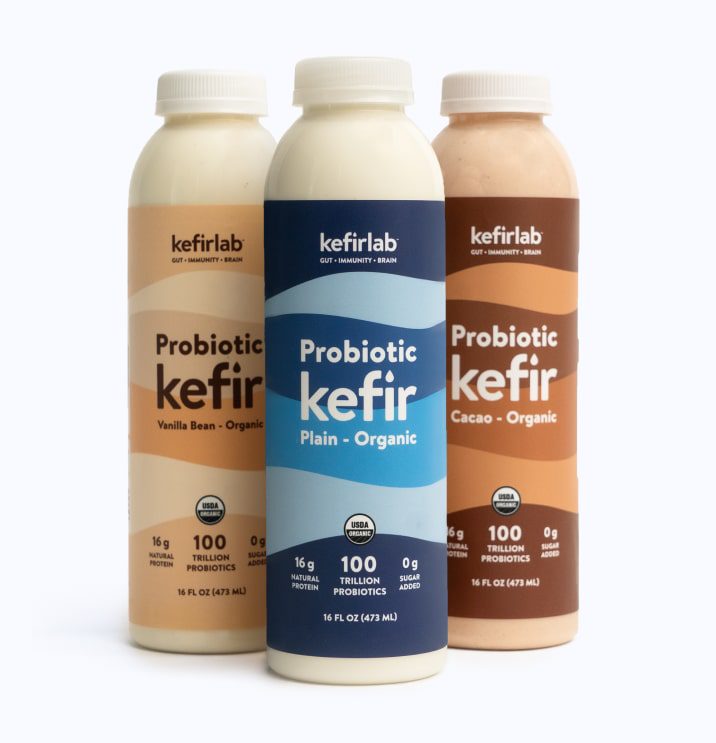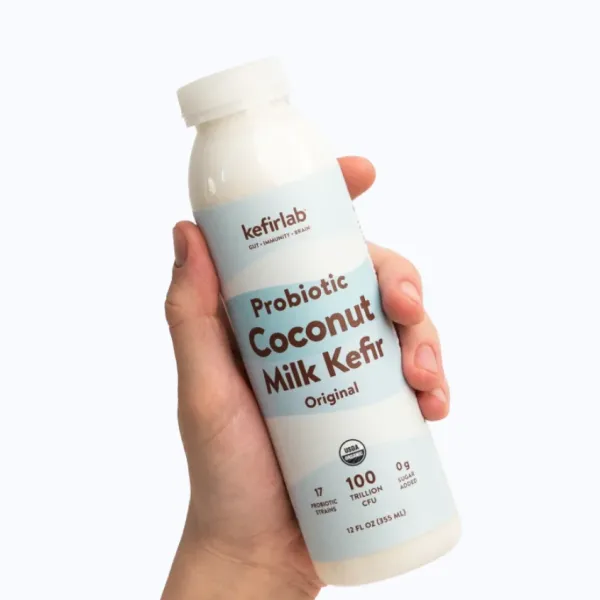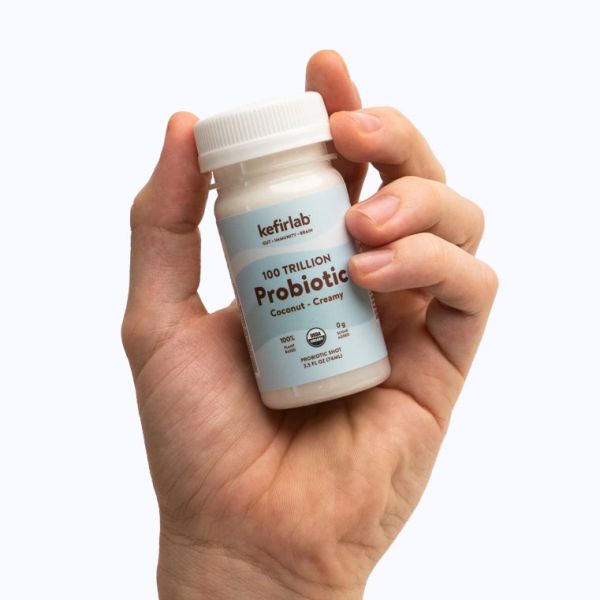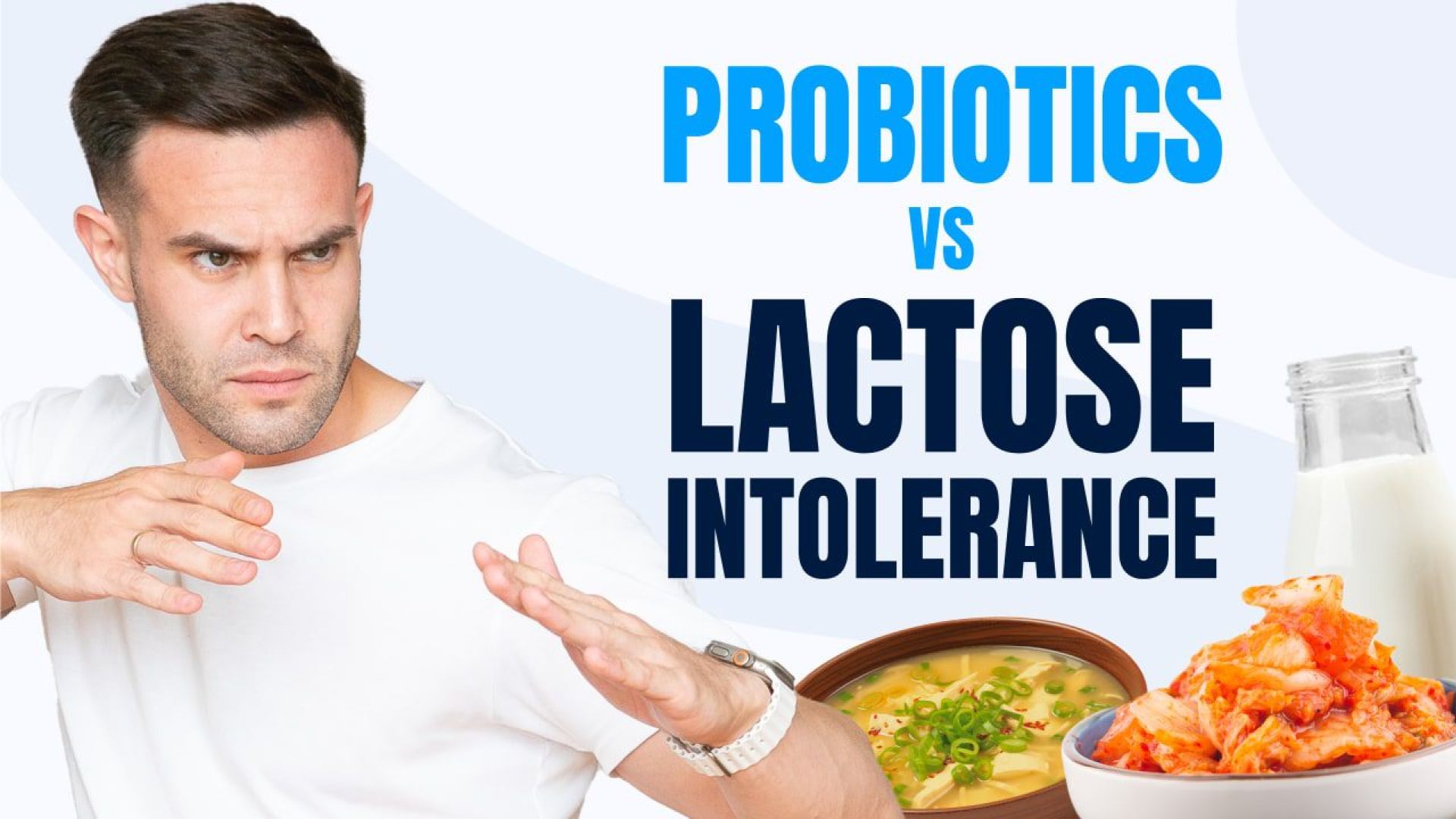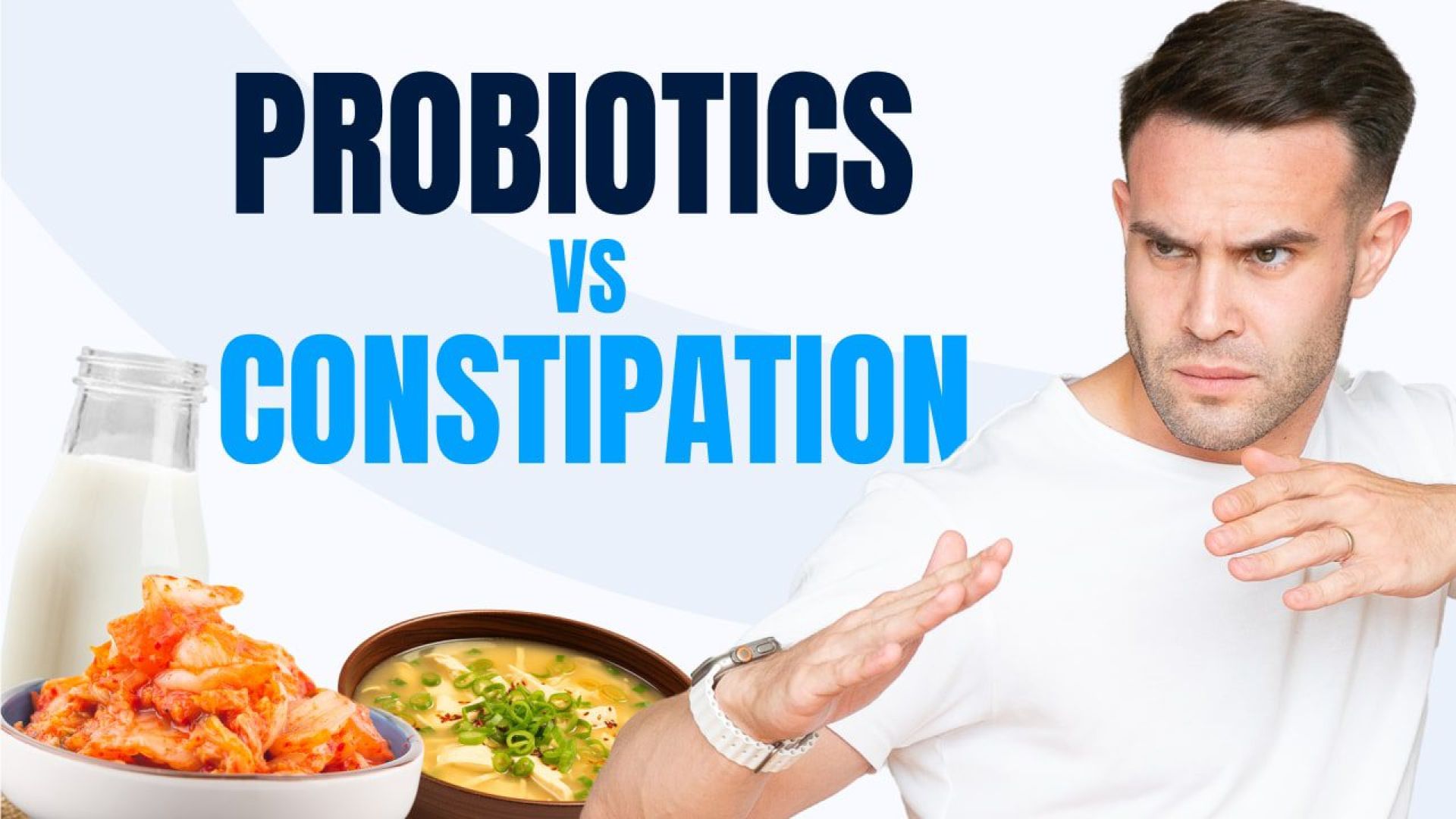How Probiotics Help IBS [The Ultimate Guide]
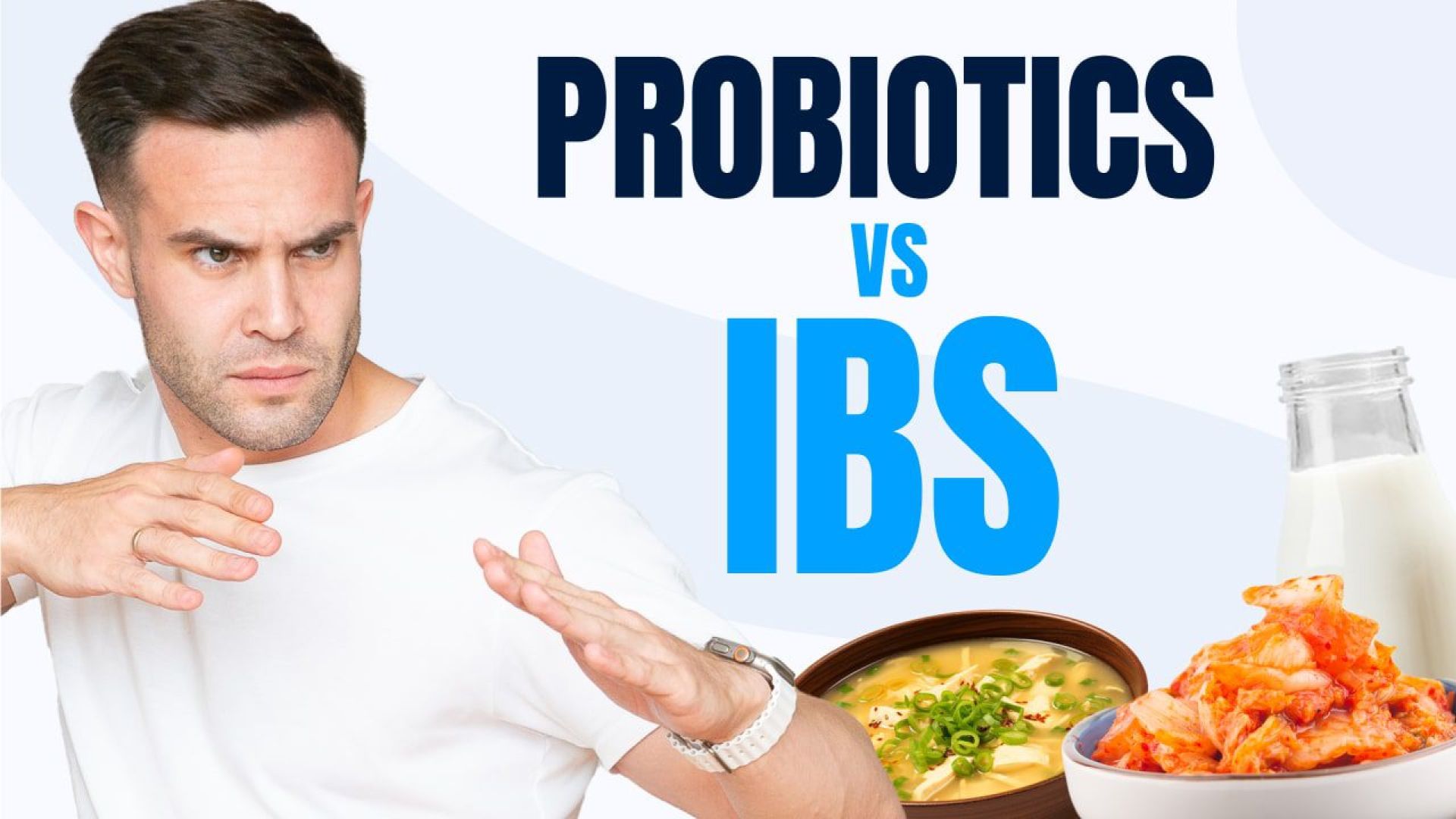
In This Article you will learn…
Managing IBS can be challenging, but there’s growing evidence that probiotics can play a significant role in alleviating its symptoms.
In this guide, you’ll learn about IBS, the benefits of probiotics, and how to incorporate them into your daily routine for optimal gut health.
Don’t like to read? Watch a video
Understanding IBS
What is IBS?
Irritable Bowel Syndrome (IBS) is a chronic condition that affects the large intestine, causing symptoms such as abdominal pain, bloating, gas, diarrhea, and constipation.
It’s a functional gastrointestinal disorder, meaning that while the digestive system looks normal, it doesn’t work as it should.
Symptoms of IBS
The symptoms of IBS can vary widely from person to person. Common symptoms include abdominal pain or cramping, bloating, gas, diarrhea, constipation, or alternating between the two.
Certain foods, stress, and hormonal changes can trigger these symptoms.
Causes of IBS
The exact cause of IBS is unknown, but several factors are believed to contribute to its development.
These include abnormal gastrointestinal motility, increased sensitivity to pain, gut-brain interactions, bacterial overgrowth in the intestines, and genetic predisposition.
Stress and diet can also play a significant role in triggering symptoms.
Diagnosis and Treatment
Options Diagnosing IBS typically involves ruling out other conditions with similar symptoms.
This can include blood tests, stool tests, and colonoscopy. Treatment for IBS often involves lifestyle and dietary changes, stress management, and sometimes medications.
Increasingly, probiotics are being recommended as a part of the treatment plan to help manage symptoms.
The Role of Probiotics in Gut Health
What are Probiotics?
Probiotics are live microorganisms that provide health benefits when consumed in adequate amounts.
They are often called “good” or “friendly” bacteria because they help maintain a healthy gut flora, which is crucial for overall digestive health.
How Probiotics Work
Probiotics work by restoring the natural balance of gut bacteria. They can help suppress the growth of harmful bacteria, improve the gut barrier function, and modulate the immune system.
This can lead to improved digestion, reduced inflammation, and enhanced gut health.
Types of Probiotics
There are many different strains of probiotics, each with its unique benefits.
Some of the most common and well-researched strains include Lactobacillus, Bifidobacterium, and Saccharomyces boulardii.
Different strains can help with various health issues, so it’s essential to choose the right one for your specific needs.
KefirLab Products
KefirLab offers a range of high-quality probiotic products, including Probiotic Shots and Coconut Kefir.
These products are designed to provide you with a potent dose of beneficial bacteria to support your gut health.
For example, our Probiotic Shots are a convenient way to boost your intake of probiotics. At the same time, our Coconut Kefir offers a dairy-free option packed with gut-friendly bacteria.
Integrating these products into your daily routine can help improve your overall gut health and manage symptoms of IBS more effectively.
How Probiotics Help Manage IBS
Probiotics and IBS
Symptoms Relief Probiotics can play a significant role in managing IBS symptoms. They help restore the balance of gut bacteria, alleviating symptoms such as bloating, gas, diarrhea, and constipation.
Probiotics have been shown to reduce the frequency and severity of IBS symptoms, making them a valuable addition to the treatment plan.
Scientific Evidence
Supporting Probiotics for IBS Numerous studies have highlighted the benefits of probiotics in managing IBS.
Research indicates that specific probiotic strains, such as Bifidobacterium and Lactobacillus, can help reduce IBS symptoms.
For example, a study published in the Journal of Gastroenterology found that patients who took probiotics experienced significant improvements in abdominal pain and bloating compared to those who took a placebo.
These findings support using probiotics as a complementary approach to managing IBS.
Personal Stories and Testimonials
Hundreds of people with IBS have found relief through the use of probiotics.
For example, Jane, a regular user of KefirLab’s Probiotic Shots, shared her experience: “After incorporating KefirLab’s Probiotic Shots into my daily routine, I noticed a significant reduction in my IBS symptoms.
The bloating and discomfort have decreased, and I feel more at ease throughout the day.”
We receive hundreds of testimonials from people who see probiotics’ positive impact on managing IBS.
Choosing the Right Probiotics for IBS
Factors to Consider
When selecting probiotics for IBS, it’s essential to consider several factors:
- Strain Specificity: Different strains of probiotics offer different benefits. Look for strains specifically studied for IBS, such as Bifidobacterium infantis and Lactobacillus plantarum.
- Dosage: The effectiveness of probiotics can depend on the dose. It’s often recommended to start with a lower dose and gradually increase it to see how your body responds.
- Product Quality: Choose high-quality probiotic products from reputable companies. Check for products that have been third-party tested for potency and purity.
KefirLab’s Probiotic Products
KefirLab offers a variety of probiotic products that are ideal for managing IBS. Our Dairy Kefir, Probiotic Shots, and Coconut Kefir are all rich in beneficial bacteria.
- Dairy Kefir: Although not sold online, our Dairy Kefir is a traditional fermented drink packed with probiotics that can support gut health.
- Probiotic Shots: These are a convenient and potent way to boost your probiotic intake. Each shot contains a high concentration of beneficial bacteria designed to improve gut health.
- Coconut Kefir: Our Coconut Kefir provides a delicious and effective way to consume probiotics for those who prefer a dairy-free option.
Integrating these products into your daily routine can help you manage IBS symptoms more effectively.
Integrating Probiotics into Your Daily Routine
Tips for Taking Probiotics Effectively
To get the most out of your probiotics, consider the following tips:
- Timing: The best time to take probiotics can vary. Some studies suggest taking them on an empty stomach, while others recommend them during or after meals. Experiment to see what works best for you.
- Consistency: Take your probiotics regularly. Consistency is vital to maintaining a healthy balance of gut bacteria.
- Storage: Store your probiotics according to the manufacturer’s instructions. Some may need refrigeration to maintain their potency.
Complementary Lifestyle
Changes While probiotics can significantly improve your gut health, combining them with other lifestyle changes can enhance their effectiveness:
- Diet: Incorporate a balanced diet rich in fiber, which can support the growth of beneficial bacteria. Avoid trigger foods that can exacerbate IBS symptoms.
- Hydration: Drink plenty of water to help digestion and reduce constipation.
- Stress Management: Stress can worsen IBS symptoms. Practice stress-reducing activities like yoga, meditation, or deep breathing exercises.
- Exercise: Regular physical activity can help improve digestion and reduce stress.
For personalized advice, consider KefirLab’s Health Coach service.
Our health coaches can provide tailored guidance on diet and lifestyle changes to support your gut health and manage IBS.
Potential Side Effects and Precautions
Understanding Possible Side
Effects While probiotics are generally safe for most people, some may experience mild side effects, such as gas, bloating, or an upset stomach.
These symptoms typically subside after a few days as your body adjusts to the probiotics.
Who Should Avoid Probiotics?
Certain individuals should exercise caution when taking probiotics.
If you have a weakened immune system, are critically ill, or have severe underlying health conditions, consult with a healthcare professional before starting probiotics.
Consulting with a Healthcare Professional
Before adding probiotics to your routine, especially if you have IBS or other gastrointestinal conditions, it’s essential to consult with a healthcare professional.
They can provide personalized advice and help you choose probiotic strains and products.
KefirLab’s Microbiome Analysis service can also offer valuable insights into your gut health and help you select the most suitable probiotics.
FAQ about IBS and Probiotics
What is Irritable Bowel Syndrome (IBS)?
Irritable Bowel Syndrome (IBS) is a chronic gastrointestinal disorder that affects the large intestine.
It is characterized by symptoms such as abdominal pain, bloating, gas, diarrhea, and constipation.
IBS is a functional disorder, meaning the digestive system looks normal but does not function properly.
How can probiotics help with IBS?
Probiotics can help manage IBS symptoms by restoring the natural balance of gut bacteria.
They can reduce inflammation, improve gut barrier function, and modulate the immune system.
Probiotics have been shown to alleviate symptoms like bloating, gas, diarrhea, and constipation, making them a valuable addition to the treatment plan for IBS.
What are the best probiotic strains for IBS?
The best probiotic strains for IBS include Bifidobacterium infantis, Lactobacillus plantarum, and Saccharomyces boulardii.
These strains have been extensively studied and shown to help reduce IBS symptoms.
It’s essential to choose a probiotic supplement that contains these specific strains for optimal results.
How long does it take for probiotics to work for IBS?
The time it takes for probiotics to work can vary depending on the individual and the severity of symptoms.
Some people may notice improvements within a few days, while others may take a few weeks to experience significant relief.
Consistency in taking probiotics is vital to achieving the best results.
Can probiotics cause side effects?
Probiotics are generally safe for most people, but some may experience mild side effects such as gas, bloating, or an upset stomach when first starting them.
These side effects are usually temporary and subside as the body adjusts to the probiotics.
If side effects persist, it’s best to consult with a healthcare professional.
Are there any people who should avoid probiotics?
Individuals with weakened immune systems, those who are critically ill, or those with severe underlying health conditions should consult with a healthcare professional before taking probiotics.
While probiotics are generally safe, certain individuals may need precautions to avoid potential complications.
How should I take probiotics to get the best results?
To get the best results from probiotics, take them consistently and follow the dosage instructions provided by the manufacturer.
It’s often recommended to take probiotics on an empty stomach. Still, some people may find it beneficial to take them with meals.
Store probiotics according to the manufacturer’s instructions to maintain their potency.
Can diet and lifestyle changes enhance the effectiveness of probiotics?
Yes, diet and lifestyle changes can enhance the effectiveness of probiotics.
A balanced diet rich in fiber supports the growth of beneficial bacteria.
Staying hydrated, managing stress, and engaging in regular physical activity can also improve gut health and complement the benefits of probiotics.
What are KefirLab’s probiotic products?
KefirLab offers a range of probiotic products, including Dairy Kefir, Probiotic Shots, and Coconut Kefir.
These products are designed to provide a potent dose of beneficial bacteria to support gut health.
Dairy Kefir is a traditional fermented drink. Probiotic Shots are convenient and potent, and Coconut Kefir offers a dairy-free option.
How do I know if probiotics are working for me?
You may notice improved IBS symptoms such as reduced bloating, gas, diarrhea, and constipation.
Additionally, overall digestive health may improve, leading to better nutrient absorption and less discomfort.
Probiotics are likely working for you if you experience significant relief from symptoms.
Should I consult a healthcare professional before taking probiotics?
It’s always a good idea to consult a healthcare professional before starting any new supplement, including probiotics.
They can provide personalized advice and help you choose the right probiotic strains and products based on your specific health needs and conditions.
Conclusion
Key Takeaways
- Understanding IBS: IBS is a chronic condition that affects the large intestine, causing symptoms like abdominal pain, bloating, diarrhea, and constipation.
- Role of Probiotics: Probiotics are beneficial bacteria that can help restore gut balance and alleviate IBS symptoms.
- Choosing Probiotics: Select probiotics with specific strains known to help IBS and ensure high-quality products.
- Integrating Probiotics: Consistency, proper timing, and complementary lifestyle changes can enhance the benefits of probiotics.
- Precautions: While generally safe, some individuals should consult with healthcare professionals before starting probiotics.
To learn more about gut health and probiotics, visit the Health Lab blog. Explore KefirLab’s range of probiotic products and services to support your journey to better gut health.
Works Cited and Relevant Studies
- Su, T., Liu, R., Lee, A., Long, Y., Du, L., Lai, S., & Zhu, H. (2022). Probiotics in Irritable Bowel Syndrome: A Review of Their Efficacy and Mechanisms. NCBI.
- Smith, A. (2022). Do probiotics help IBS? Live Science.
- Brown, J. (2019). Probiotics in Irritable Bowel Syndrome: An Up-to-Date Systematic Review. MDPI Nutrients.
- Green, C., & Black, M. (2024). Which Probiotics Are Effective in Irritable Bowel Syndrome? Medscape.
- Davis, K. (2022). Probiotics for IBS: How They Help Manage Symptoms. GI Institute.
- Thompson, E., & Lee, S. (2021). Strain-specific and outcome-specific efficacy of probiotics for the treatment of irritable bowel syndrome. The Lancet eClinical Medicine.
Join Kefir Club
Like our probiotics, our emails are clean and good for you. Spam Free. Unsubscribe anytime.
